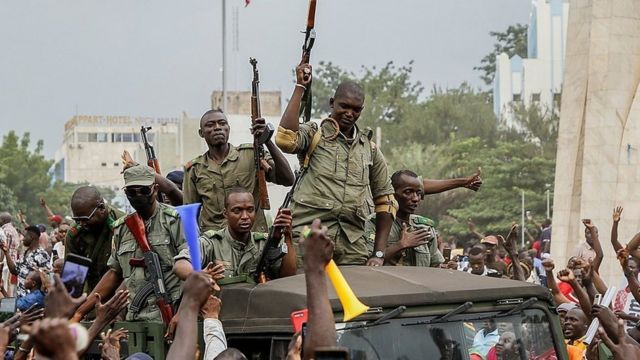Return of coup d’états in Africa
Like a reversal of fortune on the African continent, soldiers have returned to power in several states, tearing down the flags of democracy and raising up the banner of authoritarian dictatorship. In 18 months, the military has taken over political power in Sudan, Mali, Chad, Guinea, and Burkina Faso, in addition to two coup attempts […]

Like a reversal of fortune on the African continent, soldiers have returned to power in several states, tearing down the flags of democracy and raising up the banner of authoritarian dictatorship. In 18 months, the military has taken over political power in Sudan, Mali, Chad, Guinea, and Burkina Faso, in addition to two coup attempts in Niger Republic in March 2021, and in Guinea-Bissau last week. As Ghanaian President Nana Akufo-Addo describes it, the new wave of coups “represents a threat to peace, security and stability in West Africa”, while the United Nations Secretary General Antonio Guterres describes the situation as “coup epidemic in Africa.”
Africa has long been the world’s leading theatre of coups. According to a recent study by Jonathan Powell and Clayton Thyne, published in the Journal of Peace Research, military coups averaged four per year in Africa between 1960 and 2010, declining to two a year by 2019. Since then, however, the number of successful coups and attempts on the continent appear to be returning to their record levels.
Unlike the bloody putsches of the 1960s, 70s and 80s however, the more recent coups tend to involve the arrest and removal of sitting president or prime minister, rather than their summary execution or gun battles as used to be the case on the continent. But like some of the cold coups, the more recent coups have also enjoyed widespread civilian support, and even with the active connivance of organized civil society and opposition political leaders following successful or attempted tenure elongation schemes by the leaders ousted from power.
Apart from Sudan where civilians have resisted military incursion, West African countries stung by military take overs reacted differently, some jubilating and embracing the intruders. The situation is explained by an observation by Annadif Khatir Mahamat Saleh, the UN Special Representative for West Africa, who said recently that the resurgence of coups “is often the consequence of political practices that are completely out of step with the aspirations of the populations.”
As we have repeatedly stated on these pages, this newspaper totally rejects military dictatorship. However, it is apparent that democratically-elected leaders in Africa give military dictators the excuse to strike when they continue to fail the people. Indicators of failed political leadership stare everyone in the face through excruciating poverty and lack of employment opportunities for youths in Africa. Human Development Indices in Africa are not encouraging, as poverty and hopelessness continue to eat deep into the soul of the population.
For instance, the poverty rate in Burkina Faso is put at 43.8 per cent, Mali (41.9 per cent), Sudan (55.6 per cent), Guinea (36.1 per cent), Niger (45.4 per cent) and Chad (42 per cent). Poverty rates provide a grim picture of unemployment in these countries, where peasant farming constitutes the main source of employment, and youths who obtain academic qualifications, including degrees, wallow in frustration as a result of unemployment, under-employment, and unacceptably low wages, for those who manage to secure jobs.
No doubt bad governance and corruption combine to give excuses for the military to strike in these African countries, and serve as a veritable warning to others where democratic government remains in place, but rather in name only. However, there is no one-size fits all explanation for the resurgence of coups on the continent.
The increasing number and power of international actors, particularly China, Russia and France have also been fingered in some quarters. France has a long history of being in bed with sit-tight African leaders and in turning a blind-eye to dynastic successions, rather than change of government through popular elections, in countries within its sphere of influence on the continent, as in Chad last year. China’s enduring policy of no-interference in the domestic affairs of African countries has also been said to encourage coupists to take power with little or no fear of retribution or sanctions from the West.
Regional political and economic groups have been toothless. To deal with the epidemic of coups in Africa, there is need for a paradigm shift in the way political leaders conduct their affairs in Africa. It is not enough for the Economic Community of West Africa (ECOWAS) leaders to impose sanctions, close borders, and threaten to isolate the dictators. West Africa’s political leaders must engage themselves in a reality check to admit how they have failed Africans and created the fertile soil for coups. Instead of developing their economies through regional economic cooperation, African leaders enslave themselves to the West, demonstrating total helplessness at rejuvenating the continent’s economy.
We call on the African Union and ECOWAS to come together and find a workable mechanism for preventing or dealing with coups when they happen. Sanctions on military juntas have proved ineffective so far. Only the delivery of democratic dividends will make rid the continent of coups. Governance in Africa needs a rigorous surgical operation.
